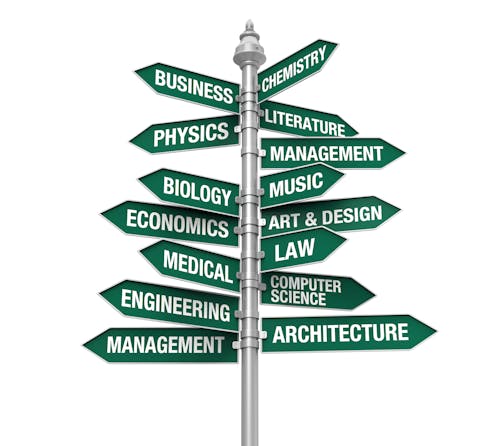Some want to get rid of college majors – here's how that could go wrong
- Written by Matthew J. Mayhew, William Ray and Marie Adamson Flesher Professor of Educational Administration, The Ohio State University

Should college majors be a thing of the past?
That idea received a fresh airing when author Jeffrey Selingo suggested recently that it’s “time to end college majors as we know them[1].”
As a researcher who studies higher education[2], I concede that something about the way colleges and universities educate students in the United States needs to change. But the needed change may be more about how higher education institutions are run as opposed to getting rid of the college major altogether.
Selingo suggests that college majors are antiquated and limit students from developing the skills they need to be effective in today’s digital economy. He cites examples of innovations and radical practices at some colleges and universities – including one where he serves as a special adviser to the president[3] – to bolster his case.
Much of the criticism[4] of college majors comes from those who work at larger institutions. This is significant because, unlike community colleges or smaller private institutions, larger institutions are often more wedded to academic majors for organizing and delivering education to their students.
How colleges are organized
At larger institutions, each school – such as business or education – often operates with its own set of policies and procedures. These range from guidelines for admissions to how credit hours are determined. This administrative design becomes highly problematic for students who wish to take courses across schools – let alone create their own curricular experience – because the rules change based on where a given course is housed.
In the most recent volume of “How College Affects Students: 21st Century Evidence that College Work[5],” the authors, in their synthesis of over 1,800 empirical articles published from 2003 to 2013, found overwhelming support that college majors are associated with many positive educational outcomes, such as content mastery and critical thinking. The authors also found that college majors are related to earning more money over a lifetime.
Even more compelling is how graduates from different majors fare in the labor market. Compared to students who find a job outside of their selected major, those who land a job closely related[6] to their major field of study are much more likely to report higher rates of employment, job satisfaction and earnings over time. But the strength of these relationships vary based on a number of factors. Those factors include institutional type, size, and whether the institutions are public or private.
What remains unknown is precisely why the college major plays such an important role in helping students succeed. What does a college major represent? Does a college major signify exposure to curricula and practices that bring students together based on shared academic interests?
Without good answers to these and related questions, colleges and universities must be careful not to abandon college majors entirely. Completely ending college majors as we know them may invite a host of problems. Here are just a few.
1. Lack of convening power
Ending college majors assumes that institutions have the know-how and ability to bring students together based on academic interests. To distance themselves from majors, some institutions are attempting to restructure learning environments in a way that brings different disciplines together. Yet, there’s not much evidence[7] to suggest that students are learning more as a result of these efforts.
2. Student confusion
Ending college majors assumes that students are developmentally ready to design their undergraduate experiences in ways that will maximize learning and help them get a job. Selingo suggests that educators “give students an opportunity in their first year – or preferably starting through online exploration the summer before – to find the appropriate fit for their interests.” Theoretically, this idea sounds great. However, it flies in the face of the findings related to this generation of college students[8]. The reality is most students are not developmentally ready to identify their interests, let alone design their own course of study.
3. Increased costs
Ending college majors may push off the inevitable need for structured discipline-specific training until graduate school. This subsequently increases the costs of education. The evidence[9] is clear: Going to college helps students master content related to their major field of study. Business majors are learning investment strategies. Education majors are learning how to teach young children in the classroom.
The bottom line is there is a need to be careful not to assign blame for antiquated educational delivery systems onto the college major, especially in light of the data[10] that show college majors are positively associated with learning and success beyond college.
References
- ^ time to end college majors as we know them (www.chronicle.com)
- ^ researcher who studies higher education (scholar.google.com)
- ^ special adviser to the president (publicservice.asu.edu)
- ^ criticism (www.nytimes.com)
- ^ How College Affects Students: 21st Century Evidence that College Work (www.wiley.com)
- ^ closely related (eric.ed.gov)
- ^ there’s not much evidence (www.nap.edu)
- ^ findings related to this generation of college students (www.wiley.com)
- ^ evidence (www.wiley.com)
- ^ data (www.wiley.com)
Authors: Matthew J. Mayhew, William Ray and Marie Adamson Flesher Professor of Educational Administration, The Ohio State University

